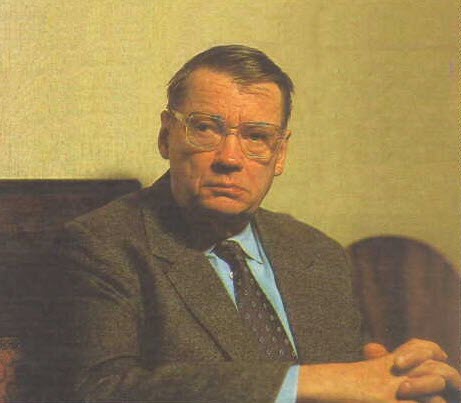Contents

Boris Alexandrovich Tchaikovsky (Борис Александрович Чайковский), 1925–1996, was a distinguished Soviet and Russian composer, part of the generation that emerged after World War II. Despite sharing a surname, he is not directly related to the more famous Pyotr Ilyich Tchaikovsky. Born in Moscow, Boris Tchaikovsky was a significant figure in 20th-century music, known for his unique style that blended traditional Russian music with innovative techniques.
Early life and education
Boris Tchaikovsky showed musical promise from a young age and pursued formal education in composition. He studied at the Moscow Conservatory, where his teachers included notable composers such as Dmitri Shostakovich, Vissarion Shebalin, and Nikolai Myaskovsky. These mentors greatly influenced his development as a composer, encouraging him to explore both traditional forms and contemporary innovations.
Musical style and contributions
Boris Tchaikovsky’s music is characterized by its lyrical melodies, rich harmonies, and intricate textures. He was adept at integrating elements of Russian folk music with modernist techniques, creating works that were both accessible and sophisticated. His output was diverse, encompassing symphonies, chamber music, piano works, and film scores, among other genres. He chiefly wrote in a tonal style, but also experimented with serialism.
One of Boris Tchaikovsky’s most acclaimed works is “The Symphony of the Blockade,” inspired by the siege of Leningrad during World War II. This piece is notable for its emotional depth and how it captures the resilience of the human spirit in the face of adversity. Tchaikovsky’s work for cinema also stands out, particularly his scores for films such as “The Wind” and “Don Quixote.”
Boris Tchaikovsky is considered a part of the so-called second-generation of Russian composers, following in the steps of composers such as Pyotr Ilyich Tchaikovsky and Modest Petrovich Mussorgsky.
Accolades
Boris Tchaikovsky was awarded the honorary title ”People’s Artist of the USSR” by the Soviet government. This title had practical value since the honorees were afforded certain privileges and were more likely to receive commissions from the Minister of Culture.
Legacy
Though Boris Tchaikovsky is not as well-known internationally as some of his contemporaries, his contribution to Russian and Soviet music is now becoming increasingly recognized. His works continue to be performed and recorded, and he has been the subject of music festivals and scholarly research. His approach to composition, marked by a balance between tradition and innovation, has inspired subsequent generations of composers.
In summary, Boris Tchaikovsky was a composer of considerable depth and originality whose music reflects a deep engagement with the cultural and historical currents of his time. His legacy is that of a composer who navigated the complexities of Soviet music with integrity and creativity, leaving behind a body of work that continues to resonate with audiences today.
The Boris Tchaikovsky Society
The Boris Tchaikovsky Society works to promote and disseminate Boris Tchaikovsky’s music.
It was formally established as a non-profit organization in 2002 by the composer’s widow, Yanina Iossifovna Moshinskaya-Tchaikovskaya, together with some of his former pupils and people loving his music, but the group have roots going back to the early 1990s. Since 1998, they have been running a website with information regarding the composer.
The society has assisted in the issue of over 20 CDs with his work, including some world premiere recordings, and is also active in preparing relevant musical festivals and events.
Examples of events associated with The Boris Tchaikovsky Society are The Boris Tchaikovsky Chamber Music Festival in Gent (Belgium) 2004, Cello Concerto in Paris (France) 2004, Six Etudes in Odense (Denmark) 2005, performance of chamber works at the “SovietFest” in Manchester (UK) 2006, and performances at West Cork Chamber Music Festival in Ireland 2010-2011).
The Boris Tchaikovsky International Award
This award was launched in 2005 by the Boris Tchaikovsky Society. The Artistic Council of the Awards includes several notable musicians, including former pupils of Boris Tchaikovsky.
Reciepients in 2005 – 2021
2005: Vassily Nikolayev, composer, for creating the Piano Trio
2005: Fyodor Stepanov, composer, for creating the Sonata for Violin and Piano
2008: Nikolay Khondzinsky, conductor, for outstanding achievements in the preparation and performances of symphonic and choral works of 20th-century composers
2008: Kirill Ershov, conductor, for preparation, performances and recordings of Boris Tchaikovsky orchestral works
2010: Dmitry Koltsov, composer and musicologist, [posthumously] for his chamber and vocal works and for the article about Boris Tchaikovsky’s Second Piano Sonata.
2010: Kirill Radev, choreographer for the ballet Sinfonietta with the music of Boris Tchaikovsky
2010: Olga Solovieva, pianist, for performances and recordings of Boris Tchaikovsky’s works for piano
2015: Sergey Zhuravel, flautist, for outstanding artistic achievements in the performances and for concert programmes played in 2010-2015
2015: Konstantin Semyonov, choreographer for the ballet Labyrinth with the music of Boris Tchaikovsky’s Piano Concerto.
2019: Ivan Nikiforchin, conductor, for Herman Galynin’s works for strings orchestral editions, concert performances and studious recordings, and for the outstanding achievements in the performances of Russian XX-century composers’ music.
2021: Ernest Alaverdian, clarinettist, for outstanding achievements in performances and recordings of Boris Tchaikovsky and Mieczyslaw Weinberg works for clarinet
2021: Elizaveta Pakhomova, singer, for highly artistic performances and recordings of Nikolay Myaskovsky’s vocal works
2021: Arina Tsytlenok, composer and organist, for creating the Piano Concerto and high mastery in instrumentation
